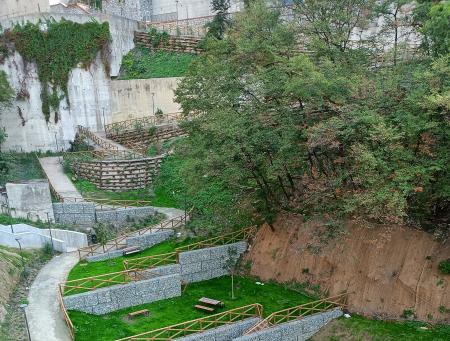
Area characterisation:
The Municipality of Genova has transformed the Gavoglio area in the Lagaccio district into a 10000 m2 urban park. The former military barracks in the area have been demolished and the area has developed into a public, inclusive and sustainable urban park built by almost entirely nature-based solutions. All functions of the park have been designed to be compatible with nature and the project involved the implementation of 12 different nature-based solutions.
Objective:
The city of Genoa experiences acute densification and lack of public green spaces, making urban heat stress a pronounced challenge. Air pollution and biodiversity loss are among the other challenges Genova targeted to address through NbS implementation.
Potential impacts/benefits:
The concentration levels of NO2 and O3 at the reference site in Via Napoli was significantly (1.5 to 3 times) greater than the one recorded in Gavoglio during the current data acquisition period, with a peak in autumn-winter time. Slope afforestation demonstrated the moderate contribution to species diversity among all NbS implemented in the Gavoglio area. Survey among the stakeholders indicated that the largest number of respondents (55%) quantified the increase in values for residential properties between 6% and 10%. Approximately 4925 m3 of demolition materials were reused on site.
Actions:
Trees have been planted in the Gavoglio Park in an afforestation effort to increase slope stability. Previously, the slopes have been devoid of any vegetation. The afforestation will increase resistance to prolonged periods of drought, increase the biodiversity of the area and increase slope stabilisation. Mature plants of at least 120 cm in height have been used when planting on the slopes. A shelter, a polycarbonate stem protector, was used with each plant to ensure protection, as well as for identification of the plants during mowing or other operations. In addition to the shelter, anchorage via a bamboo pole and rooting aids such as a mulching disc has been used.
Transferability of result:
One of the typical aspects of the Ligurian landscape is the treatment of the hilly slopes to solve the problems due to the poor stability of the steep slopes. The afforestation solution adopted is particularly suitable for solving similar problems typical of the area. The construction does not require earth movement significantly capable of causing damage to vegetation or the ecosystem and the environmental impact is very small.
Lessons learnt:
Nature-based solutions offer an integrative direction for multidisciplinary cooperation, but the cooperation must be facilitated carefully. Citizens are willing to actively participate in co-creation and co-monitoring if tools and means of participant retention are carefully considered and applied.
Organisations:
City of Genova, https://smart.comune.genova.it/
LAND Italia, https://www.landsrl.com/
NBS goals:
- Enhancing sustainable urbanization
- Restoring ecosystems and their functions
- Developing climate change adaptation
- Improving risk management and resilience
- Urban regeneration through nature-based solutions
- Nature-based solutions for improving well-being in urban areas
- Multi-functional nature-based watershed management and ecosystem restoration
- Increasing carbon sequestration through nature-based solutions
NBS benefits:
- Greater ecological connectivity across urban regenerated sites
- Improve connectivity and functionality of green and blue infrastructures
- Increase Biodiversity
- Increase quality and quantity of green and blue infrastructures
- Changing image of the urban environment
- Creation of green jobs relating to construction & maintenance of NBS
- Improve air quality
- Increase accessibility to green open spaces
- Increase amount of green open spaces for residents
- Increase social interaction
- Increase well-being
- Provision of health benefits